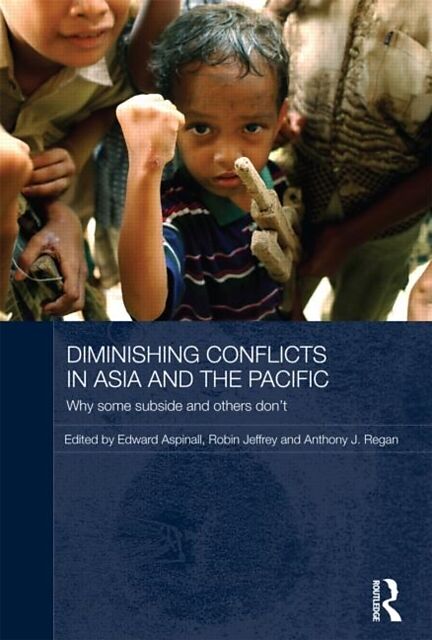Diminishing Conflicts in Asia and the Pacific
Einband:
Fester Einband
EAN:
9780415670319
Untertitel:
Why Some Subside and Others Dont
Genre:
Politik, Gesellschaft & Wirtschaft
Autor:
Edward (Australian National University) Aspinall
Herausgeber:
Taylor and Francis
Auflage:
1. Auflage
Anzahl Seiten:
298
Erscheinungsdatum:
26.09.2012
ISBN:
978-0-415-67031-9
Informationen zum Autor Robin Jeffrey is a Visiting Research Professor in the Institute of South Asian Studies at the National University of Singapore. His research interests include India and South Asia, as well as the Punjab insurgency. Edward Aspinall is a Senior Fellow in the Department of Political and Social Change, Australian National University. His research focuses on comparative politics of democratization, ethnic politics and nationalism, and he has published widely in these areas. Anthony Regan is a Fellow in the State, Society and Governance in Melanesia Program, Australian National University. He is a constitutional lawyer who has advised in peace processes and post-conflict constitution-making processes in a number of countries, and written extensively on a number of those cases. Klappentext Since the publication of the 2005 Human Security Report, scholars and policy-makers have debated the causes, interpretation and implications of what the report described as a global decline in armed conflict since the end of the Cold War. Focusing on the Asia-Pacific region, this book analyses the causes and patterns of this decline. Zusammenfassung Since the publication of the 2005 Human Security Report, scholars and policy-makers have debated the causes, interpretation and implications of what the report described as a global decline in armed conflict since the end of the Cold War. Focusing on the Asia-Pacific region, this book analyses the causes and patterns of this decline. In few regions has the apparent decline in conflict been as dramatic as in the Asia-Pacific, with annual recorded battle deaths falling in the range of 50 to 75 percent between 1994 and 2004. Drawing on a wide range of case studies, this book looks at internal conflicts based on the mobilization of ethnic and nationalist grievances, which have been the most costly in human lives over the last decade. The book identifies structures, norms, practices and techniques that have either fuelled or moderated conflicts. As such, it is an essential read for students and scholars of international relations, peace and conflict studies and Asian studies. Inhaltsverzeichnis 1. Introduction: Diminishing Conflicts: learning from the Asia-Pacific Part 1: Conflict diminished? 2. Timor Leste: international intervention, gender and the dangers of negative peace 3. Maluku: anomie to reconciliation 4. Aceh: democratization and the politics of co-option 5. Solomon Islands: from uprising to intervention 6. Punjab: federalism, elections, suppression 7. Sri Lanka: the end of war and the continuation of struggle Part 2: Conflict deferred? 8. Bougainville: conflict deferred? 9. The Chittagong Hill Tracts (CHT): diminishing violence or violent peace? 10. Eastern Burma: long wars without exhaustion 11. Fiji: the politics of conflict reduction Part 3: Conflict undiminished? 12. Southern Thailand: marginalization, injustice and the failure to govern 13. Pakistan's Federally Administered Tribal Areas: cause or symptom of national insecurity? Paul 14. Southern Philippines: the ongoing saga of Moro separatism 15. Kashmir: placating frustrated people 16. The Southern Highlands of Papua New Guinea: conflict ignored 17. Conclusion: Lessons ...
Autorentext
Robin Jeffrey is a Visiting Research Professor in the Institute of South Asian Studies at the National University of Singapore. His research interests include India and South Asia, as well as the Punjab insurgency.Edward Aspinall is a Senior Fellow in the Department of Political and Social Change, Australian National University. His research focuses on comparative politics of democratization, ethnic politics and nationalism, and he has published widely in these areas.Anthony Regan is a Fellow in the State, Society and Governance in Melanesia Program, Australian National University. He is a constitutional lawyer who has advised in peace processes and post-conflict constitution-making processes in a number of countries, and written extensively on a number of those cases.
Klappentext
Since the publication of the 2005 Human Security Report, scholars and policy-makers have debated the causes, interpretation and implications of what the report described as a global decline in armed conflict since the end of the Cold War. Focusing on the Asia-Pacific region, this book analyses the causes and patterns of this decline.
Inhalt
1. Introduction: Diminishing Conflicts: learning from the Asia-Pacific Part 1: Conflict diminished? 2. Timor Leste: international intervention, gender and the dangers of negative peace 3. Maluku: anomie to reconciliation 4. Aceh: democratization and the politics of co-option 5. Solomon Islands: from uprising to intervention 6. Punjab: federalism, elections, suppression 7. Sri Lanka: the end of war and the continuation of struggle Part 2: Conflict deferred? 8. Bougainville: conflict deferred? 9. The Chittagong Hill Tracts (CHT): diminishing violence or violent peace? 10. Eastern Burma: long wars without exhaustion 11. Fiji: the politics of conflict reduction Part 3: Conflict undiminished? 12. Southern Thailand: marginalization, injustice and the failure to govern 13. Pakistan's Federally Administered Tribal Areas: cause or symptom of national insecurity? Paul 14. Southern Philippines: the ongoing saga of Moro separatism 15. Kashmir: placating frustrated people 16. The Southern Highlands of Papua New Guinea: conflict ignored 17. Conclusion: Lessons

Leider konnten wir für diesen Artikel keine Preise ermitteln ...
billigbuch.ch sucht jetzt für Sie die besten Angebote ...
Die aktuellen Verkaufspreise von 6 Onlineshops werden in Realtime abgefragt.
Sie können das gewünschte Produkt anschliessend direkt beim Anbieter Ihrer Wahl bestellen.
Loading...
Die aktuellen Verkaufspreise von 6 Onlineshops werden in Realtime abgefragt.
Sie können das gewünschte Produkt anschliessend direkt beim Anbieter Ihrer Wahl bestellen.
| # | Onlineshop | Preis CHF | Versand CHF | Total CHF | ||
|---|---|---|---|---|---|---|
| 1 | Seller | 0.00 | 0.00 | 0.00 |
